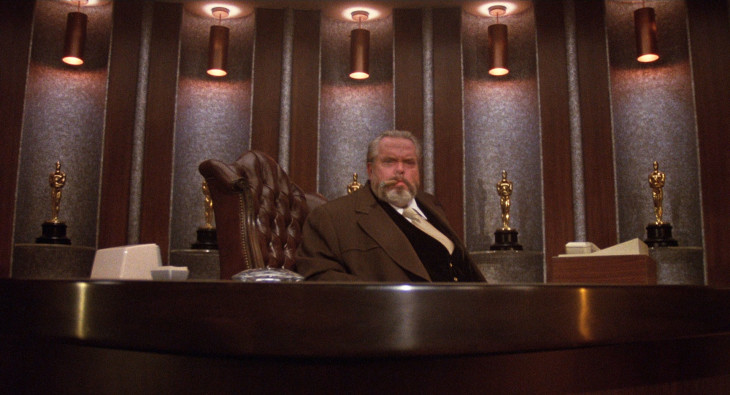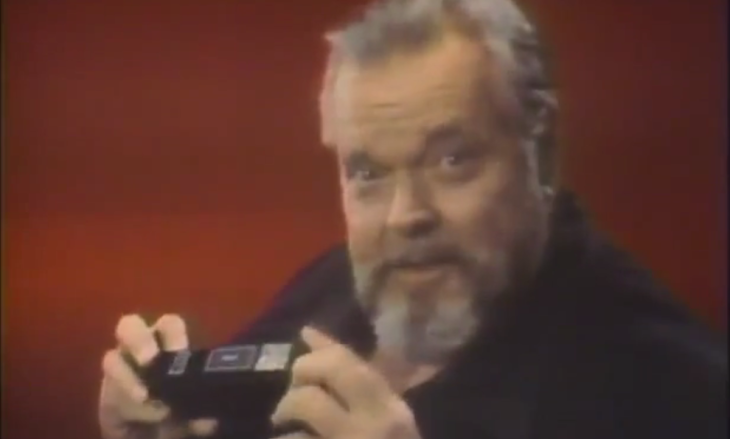From the monumental miracle that is Citizen Kane to haphazard and highly-contested productions in Mr. Arkadin and The Magnificent Ambersons, Orson Welles’s greatest pursuits have held a fascination with the fallen individual, the rise and inevitable denouement of success under hubristic feats or the bloat of American capitalism.
The UW Cinematheque (i.e. many of the same folks who program the Wisconsin Film Festival) concluded the first half of their centennial celebration of the Kenosha native in February with A Touch of Evil, but their slate still merely scratched the surface. I suspect they knew this, which is why the Wisconsin Film Festival has dedicated part of this year’s schedule to furthering that celebration. Too Much Johnson, Crack in the Mirror, and Chimes at Midnight are all selections that straddle “Restorations and Recoveries” and their own celebratory program, one heralded with an opening night screening (and a subsequent one on Wed, Apr 15) of Magician: The Astonishing Life and Work of Orson Welles.
The 2014 film, by documentarian and Oscar montage craftsman Chuck Workman, drudges up rare and, to quote the film guide “tantalizing clips” from a career that spans half a century. That means scrapbooking the young radio megastar’s early success, his carte blanche contract with RKO, his status as an accomplished magician and even Welles’ role as an ambassador to Latin America. That also means interviews with longtime friend and Criterion’s unofficial Welles scholar Peter Bogdanovich, moments with Welles’ partner Oja Kodar, and footage from the director’s never-finished The Other Side of the Wind. At 94 minutes though, Workman’s effort doesn’t near the Warholian running time required to cover everything.
But that’s okay! As a primer for the film’s Madison premiere, as well as a supplement to Welles’ curiously varied resume, here’s a rundown of some of the lesser-known and occasionally just lesser pursuits of the greatest American auteur. Rest assured, even the camera commercials are unequivocally Welles:
The Hearts of Age (1934)
It’s damn near impossible to summarize such a long and tempestuous career in a single film but to Mr. Workman’s credit, some of those promised rarities include snippets from one of Welles’ earliest and still surviving endeavors. Essentially the byproduct of Welles and a childhood friend dicking around with a camera in 1934, The Hearts of Age, while technically crude, already shows the director’s knack for improvisation and desire to push creative restrictions. You know, the kind of things that ultimately defined his groundbreaking work seven years later.
Le Chiffre, Casino Royale (1967)
Before Craig, Brosnan, or Connery, there was only Niven. Well, sort of. In this 1967 adaptation of Sir Ian Fleming’s original James Bond novel, David Niven stars as “Sir James Bond” in a film that’s spoofier than the hard-hitting spy thriller Martin Campbell would turn out nearly 40 years later. Welles’ role as Le Chiffre, a financier for terrorist cabal SMERSH, remains the same as its 2006 counterpart save for a high-stakes poker tournament getting swapped out for baccarat. Oh, and Welles’ insistence on making his character a magician. There’s little attempt at a European accent, but when your presence can dim lights and a snap of your fingers can entrance beautiful bystanders, who really needs Mads Mikkelsen anyway?
Narrator/Nag/Chuchundra, Rikki Tikki Tavi (1975)
Welles’ voice commanded a presence like no other. In Magician, Workman recalls some of Welles’ most famous radio broadcasts, including selections from The Shadow and the notoriously misinterpreted War of the Worlds episode. That booming dimension of gravitas is likely what led Looney Tunes stalwart Chuck Jones to cast Welles in this 1975 short. An adaptation of a Rudyard Kipling story in which a British colonial family adopts a mongoose, Rikki, as their pet, Rikki Tikki Tavi features Welles as narrator (enriching word of bungalow bathrooms) and as foe. As Nag, a baby bird-eating cobra, Welles whispers egotistical acid with a forked tongue.
Lew Lord, The Muppet Movie (1979)

The internet is curiously devoid of clips from 1979’s The Muppet Movie, but that shouldn’t stop you from seeking out the Muppets’ live-action debut if only for Orson Welles’ cameo as Hollywood big shot, Lew Lord. In addition to supplying Kermit the Frog & Co. with the “Standard Rich and Famous Contract” they so desperately seek, Kenosha’s favorite son also takes a dig at himself and his notoriously torrid relationship with the studio system. The string of golden statuettes behind him are the icing on the cake, a harsh reminder of what could have (and should have) been.
Orson Welles for: Nikka G&G Whiskey
The Zimmerian boat horn blasts. The ubiquitous fog. Welles appears to be sitting on the edge of a wharf in this ad, (one of many; dig that “Harry Lime Theme”) for Japanese whiskey Nikka G&G. Welles was known for his fondness for red meat and whiskeys and in this proto-Lost in Translation moment, the dramatist and accomplished magician’s closing lines insist on a reference to illusions of another kind — and offer a retroactive nod to Workman’s title at the same time. “It’s not a mirage, it’s an oasis.”
Orson Welles for: Vivitar Camera (1978)
Welles could sell the shit out of the products he hocked, yet for all of his enthusiastic growls schilling for the now-defunct camera manufacturer, the master auteur feigning frustration at photographing blurry images still boggles the mind.
Orson Welles for: Dark Tower (1981)
For whatever reason, Welles lent his presence to this long-forgotten and increasingly hard to find “amazing” roleplaying game of the early 1980s. Listen to that tinge of surprise when he declares victory.
Robin Masters, Magnum, P.I. (1981-1983)
https://www.youtube.com/watch?v=AvR49YdqU34
Even when his physical condition couldn’t back it up, the power of Welles’ voice persevered throughout his career — a power that served as Tom Selleck’s benefactor on Magnum, P.I.. As the mysterious figure responsible for putting up Thomas Magnum in a sporting Hawaii beach house, mysterious magnate and bestselling novelist Robin Masters’ central shtick was akin to the titular patriarch on Charlie’s Angels: only heard from and never to be seen. But boy, was Masters heard. Welles starred in several episodes, and at around the 44:00 mark of the one above, his voice is instantly recognizable even when the body double clearly isn’t. It’s also a reverse Ed Wood moment of sorts. In his last great movie, Tim Burton dubbed over of Vincent D’Onofrio’s Welles “cameo” with Pinky and the Brain voice actor Maurice LaMarche, who himself based his cartoon character off of the actor.
Pippo the Pigeon, The Enchanted Journey (1986)
Orson Welles as “Pippo the Pigeon” seems out of place. And that’s because it is. HBO’s 1986 American re-issue of Studio Korumi’s 1981 adaptation featured re-dubbed voices. The sprightly animation and stylized sound effects don’t quite jibe with Pippo’s oh-so-gravelly tones but one of Welles’s many credits is his pioneering work of voice-over narration which set off this curiosity in which a chipmunk seeks sanctuary from the hustle and bustle of city life. Full circle, I tell ya.
Unicron, Transformers: The Movie (1986)
Released posthumously and without any enthusiasm from its undervalued star, Transformers: The Movie was inevitable culmination of a franchise that had run its course. In his terribly fleeting role, Welles voices Unicron, the metallic doughnut featured in the climactic space battle of this commercial sewer drainage. True to his outspoken candor, Welles allegedly trashed his role, describing Unicron as “a big toy who attacks a bunch of smaller toys.” To add insult to insubordination, the studio lowered the actors’ voice a few decibels. In this case, “You underestimate me” might apply to more than just Galvatron.
If there’s a thesis to Magician, it’s that Welles’ life of turmoil, creative endeavors and contradictions obscured the genius and ultimately humble soul behind his work. Sure, there’s illusion in that, but after absorbing the lesser known facets of his career, I might offer a slightly different capstone: No matter how obscure the project seemed, Orson Welles never half-assed anything.
- Magician: The Astonishing Life and Work of Orson Welles plays twice at the Wisconsin Film Festival: on Thurs, Apr 9 at 9:00p at the UW Cinematheque and Wed, Apr 15 at 1:30p at Sundance Cinema 5. At the time of publication, tickets were still available for both shows.

